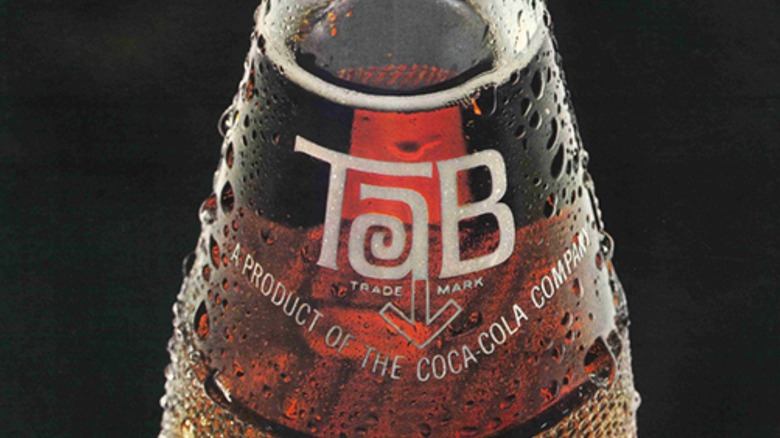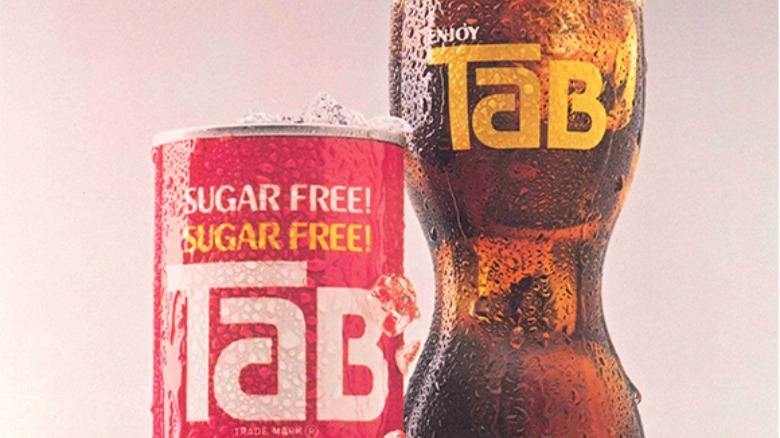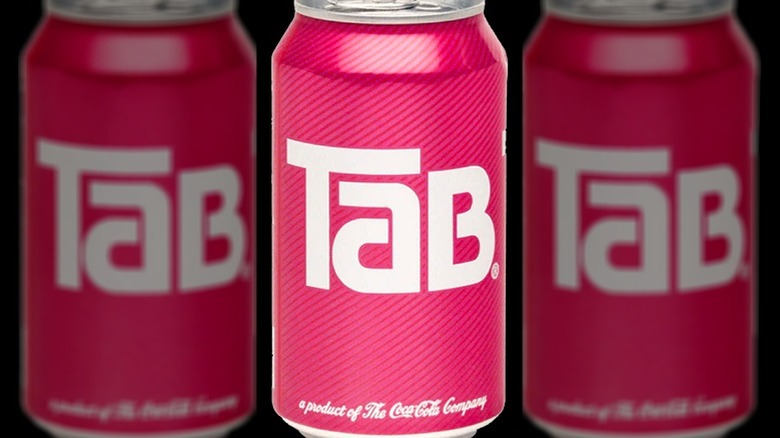What Does Tab Soda's Name Actually Mean?
Whether you are an avid soda drinker or get your beverage fix from other sources of hydration, there is no doubt that soft drinks have made a giant impact on global culinary culture. Famed international brands like Coca-Cola, Pepsi, 7UP, Sprite, Dr Pepper, and Mountain Dew have been consumed and celebrated for generations and have become household staples across socioeconomic statuses. However, there have been thousands of other soda brands over the years that are just as worthy of celebration.
Soda fans of today and yesterday are likely familiar with Tab and consider the Coca-Cola product to be a legend of the nonalcoholic beverage world. Tab is well-known as the original diet soda brand, which kick-started a trend that remains massively popular today. Tab's flavor was often described as light, slightly tart, and bubbly with hints of both lemon-lime and cola. It was low in sucrose and calories, giving it a unique, guilt-free taste. In fact, the drink's catchy ad slogan for the first decade of its life was "Everything you want without sugar" (via Eat Delights). The pop was a huge hit among women and younger consumers, who drank more soda than any age group at the time.
How did Tab come to be?
With its distinctive branding and brightly colored packaging, Tab (sometimes stylized TaB) stood out on grocery store shelves and gained a cult following after its market debut in 1963. However, according to Fast Company, Tab actually got off to a bit of a rocky start. The brand's initial sales were lower than anticipated, which affected company profits. Then came the uncanny timing of the artificial sweetener controversy, in which American consumers were made aware of the potential health dangers of chemical-based synthetic sugars that appear in many indulgent, "sugar-free" foods and drinks.
Tab's original formula contained the artificial sweeteners saccharin and cyclamate. But after lab studies determined that cyclamate led to bladder cancer in test animals, the Food and Drug Administration (FDA) banned its use in consumer goods in 1969. As a result, Tab had to tweak its recipe and decided to just use saccharin. After additional research on the negative side effects of artificial sweeteners, the FDA called on the brands that use them to print clear warning labels on their products, per Fast Company.
For a brief while, despite the hiccups and spills, Tab was the top diet cola of the 1970s and 1980s — that is, until Diet Pepsi and Diet Coke entered the picture. Sales remained steady over the years, especially among the niche Tab gang. Unfortunately, Coca-Cola discontinued Tab in 2020, bringing an end to the 57-year-long era of dark pink pop cans and fizzy goodness. To remain profitable during the COVID-19 pandemic, Coke made the tough decision to terminate production of around half of its products in order to save money and resources.
Where did the name Tab come from?
What's in a name? A lot of thought goes into a brand name, especially one that sticks in people's minds, regardless of whether they are actual purchasers or users of the product. Some brand names are literal and straightforward, while others are totally fabricated, symbolic, or take a bit of digging to unveil their intended meaning. For example, Nike is the Greek goddess of victory. Starbucks is named after a prominent character in the novel "Moby Dick." Dunkin' Donuts and American Family Insurance... yeah, these ones are fairly obvious. Pez is short for the German term for peppermint — pfefferminz (via Campaign). But the meaning behind Tab's name is a bit more obscure, and its alleged origin is just as fascinating.
One theory behind the iconic name states that Tab is actually an acronym, standing for "Totally Artificial Beverage," alluding to its controversial recipe, Snopes reports. However, this myth has been debunked by defenders of the soda as well as the Coca-Cola Company. Upon the invention of Coca-Cola's new diet product in the '60s, the executives wanted it to have a short name that was easy to say and remember, like its top-selling product Coke. The company used its IBM 1401 mainframe to come up with a list of about 2.3 million four-letter names. After cutting the list down to a couple dozen words that fit the criteria, the product names were put to the test on the market. "Tabb" (eventually shortened to "Tab") was declared the winner. It is believed that the term reminded consumers to "keep tab" on their weight. Whatever the supposed meaning, one thing remains true: Long live Tab!


